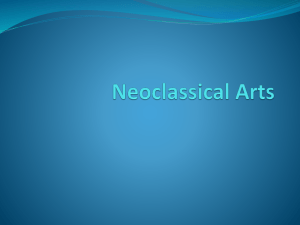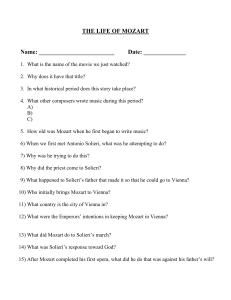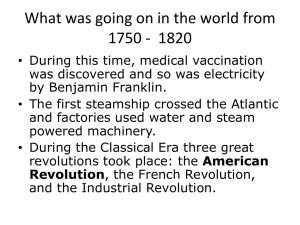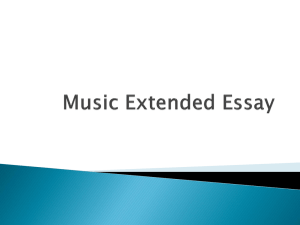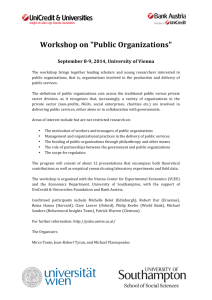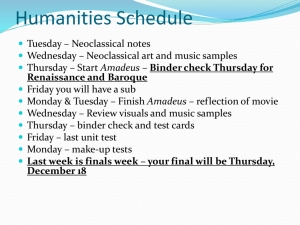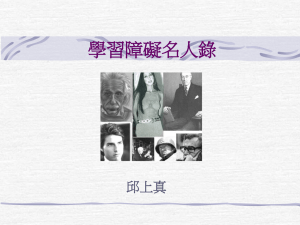Document 11902953
advertisement
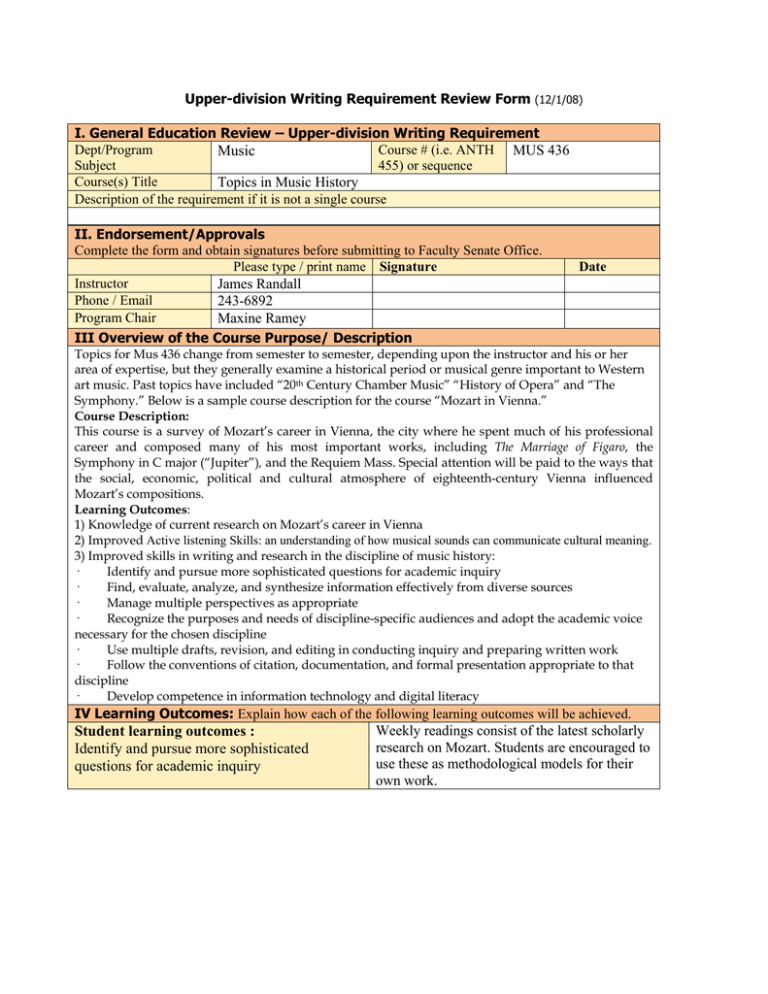
Upper-division Writing Requirement Review Form (12/1/08) I. General Education Review – Upper-division Writing Requirement Dept/Program Course # (i.e. ANTH MUS 436 Music Subject 455) or sequence Course(s) Title Topics in Music History Description of the requirement if it is not a single course II. Endorsement/Approvals Complete the form and obtain signatures before submitting to Faculty Senate Office. Please type / print name Signature Instructor James Randall Phone / Email 243-6892 Program Chair Maxine Ramey III Overview of the Course Purpose/ Description Date Topics for Mus 436 change from semester to semester, depending upon the instructor and his or her area of expertise, but they generally examine a historical period or musical genre important to Western art music. Past topics have included “20th Century Chamber Music” “History of Opera” and “The Symphony.” Below is a sample course description for the course “Mozart in Vienna.” Course Description: This course is a survey of Mozart’s career in Vienna, the city where he spent much of his professional career and composed many of his most important works, including The Marriage of Figaro, the Symphony in C major (“Jupiter”), and the Requiem Mass. Special attention will be paid to the ways that the social, economic, political and cultural atmosphere of eighteenth-century Vienna influenced Mozart’s compositions. Learning Outcomes: 1) Knowledge of current research on Mozart’s career in Vienna 2) Improved Active listening Skills: an understanding of how musical sounds can communicate cultural meaning. 3) Improved skills in writing and research in the discipline of music history: · Identify and pursue more sophisticated questions for academic inquiry · Find, evaluate, analyze, and synthesize information effectively from diverse sources · Manage multiple perspectives as appropriate · Recognize the purposes and needs of discipline-specific audiences and adopt the academic voice necessary for the chosen discipline · Use multiple drafts, revision, and editing in conducting inquiry and preparing written work · Follow the conventions of citation, documentation, and formal presentation appropriate to that discipline · Develop competence in information technology and digital literacy IV Learning Outcomes: Explain how each of the following learning outcomes will be achieved. Weekly readings consist of the latest scholarly Student learning outcomes : research on Mozart. Students are encouraged to Identify and pursue more sophisticated use these as methodological models for their questions for academic inquiry own work. The assigned papers require students to Find, evaluate, analyze, and synthesize independently analyze primary sources and to information effectively from diverse sources (see http://www.lib.umt.edu/informationliteracy/) incorporate relevant secondary sources into their arguments. Our supplementary text, Writing about Music, deals with evaluating different kinds of sources, and introduces standard reference works and journal databases important to the discipline (links to these resources at the Mansfield Library are provided through our Blackboard supplement). In our weekly discussion forums on Manage multiple perspectives as appropriate Blackboard, students are often asked to speak from a specific perspective, imagining historical points of view apart from their own. Through our weekly readings and in the text, Recognize the purposes and needs of Wingell’s Writing about Music, students discipline-specific audiences and adopt the become acquainted with standard practice academic voice necessary for the chosen within the discipline. discipline Students turn in a rough draft for their research Use multiple drafts, revision, and editing in conducting inquiry and preparing written work paper. They also receive feedback in the form of peer review (I provide a rubric). This is covered in our text, Wingell’s Writing Follow the conventions of citation, about Music. I also provide links to relevant documentation, and formal presentation online sources through our Blackboard appropriate to that discipline supplement. Written assignments, particularly the final Develop competence in information essay, require students to cite and incorporate technology and digital literacy the latest applicable research within their particular topic. V. Writing Course Requirements Check list Is enrollment capped at 25 students? If not, list maximum course enrollment. Explain how outcomes will be adequately met for this number of students. Justify the request for variance. Are outcomes listed in the course syllabus? If not, how will students be informed of course expectations? Are detailed requirements for all written assignments including criteria for evaluation in the course syllabus? If not how and when will students be informed of written assignments? Briefly explain how students are provided with tools and strategies for effective writing and editing in the major. x Yes No x Yes No Yes x No I distribute detailed requirements for each written assignment as supplementary handouts in class. These are also available through our Blackboard supplement. Students are instructed in standard style and usage for writing about music. A required text for the course is Richard Wingell’s Writing about Music, which provides a ready reference for standard practice in writing about music. Will written assignments include an opportunity for x Yes No revision? If not, then explain how students will receive and use feedback to improve their writing ability. Are expectations for Information Literacy listed in x Yes No the course syllabus? If not, how will students be informed of course expectations? VI. Writing Assignments: Please describe course assignments. Students should be required to individually compose at least 20 pages of writing for assessment. At least 50% of the course grade should be based on students’ performance on writing assignments. Clear expression, quality, and accuracy of content are considered an integral part of the grade on any writing assignment. Formal Graded Assignments Paper I: 3-4 pages (20%) Program Note Paper II: 8 pages (30%) Research Paper Vienna Journal: 8 pages (min.)(20%) Informal Ungraded Assignments Rough draft of Paper 2: 8 pages Weekly postings in discussion forum: about a page per week VII. Syllabus: Paste syllabus below or attach and send digital copy with form. ⇓ The syllabus should clearly describe how the above criteria are satisfied. For assistance on syllabus preparation see: http://teaching.berkeley.edu/bgd/syllabus.html Music 436W: Historical Topics in Music Mozart in Vienna Upper-Division Writing Course: 3 Credits Music Building 205: MW 4:10-5:30 Instructors: Maxine Ramey and James Randall E-mail: james.randall@umontana.edu maxine.ramey@umontana.edu Office/phone: JR: 209 Music Bldg. ext. 6892 Hours: JR: M,Tue 9:30-10:30, or by appt. MR: 211 Music Bldg. ext. 2155 MR: M, W 3-4 ____________________________________________________________________________________ Pre-requisites: Students must have completed both their upper division recital program and piano proficiency degree requirements, or have the expressed consent of the instructors to enroll in this course. Required Texts and Materials Mozart in Vienna, 1781-1791, by Volkmar Braunbehrens (reprinted in 436 course pack on sale at campus bookstore Weekly readings will be assigned from the course pack. Additional readings, as well as listening assignments, may be placed on Blackboard. Richard Wingell, Writing about Music: An Introductory Guide, 4th Edition (Upper Saddle River, NJ: Prentice Hall, 2008). Course Description This course is a survey of Mozart’s career in Vienna, the city where he chose to spend much of his professional career and the city in which he composed many of his most important works, including The Marriage of Figaro, the Symphony in C major (“Jupiter”), and the Requiem Mass. Special attention will be paid to the ways that the social, economic, political and cultural climate of eighteenth-century Vienna influenced Mozart’s compositions. Learning Outcomes 1) Knowledge of current research on Mozart’s career in Vienna 2) Improved Active listening Skills: an understanding of how musical sounds can communicate cultural meaning. 3) Improved skills in writing and research in the discipline of music history. Students will: · Identify and pursue more sophisticated questions for academic inquiry · Find, evaluate, analyze, and synthesize information effectively from diverse sources · Learn to write for different types of musical audiences and follow standard writing practices within musicology · Use multiple drafts, revision, and editing in conducting inquiry and preparing written work · Follow the conventions of citation, documentation, and formal presentation appropriate to musicology · Develop competence in information technology and digital literacy Evaluation: Grades will be based upon the following: Paper I (program notes) Paper II (research paper) Midterm Exam Vienna Journal 20% 30% 30% 20% • Paper extensions will only be permitted with a valid excuse—illness, death in the family, etc. • Students with special needs or disabilities should consult with the instructors for accommodations. Grading scale is as follows A AB+ B BC+ 93-100% 90-92% 88-89% 83-87% 80-82% 78-79% C CD+ D DF 73-77% 70-72% 68-69% 63-67% 60-62% 59% and below Academic Misconduct and the Student Conduct Code All students must practice academic honesty. Academic misconduct is subject to an academic penalty by the course instructor and/or disciplinary sanction by the University. All students need to be familiar with the Student Conduct Code. The Code is available for review online at www.umt.edu/SA/VPSA/Index.cfm/page/1321. MUSIC 436—SYLLABUS SCHEDULE/ASSIGNMENTS The assigned readings should be completed by the first class meeting of each week unless otherwise specified. Week 1: Jan. 23, 25 Course Pack Reading: “Preface,” pp. 1-7 Topics: Introducing Mozart: Fact, Fiction, Sources Concerts: 1/24 1/27 David Morgenroth, 7:30, MRH Mozart’s 250th Birthday Extravaganza Concert, 7:30, MRH Week 2: Jan. 30, Feb. 1 Course Pack Reading: “Chapter 1: Arrival in Vienna,” pp. 8-47 Topics: Mozart and the City: Making a living as a Freelance Musician Musical works: Various concertos: piano, horn, clarinet Week 3: Feb. 6, 8 Course Pack Reading: “Chapter 2: The Abduction-1782,” pp. 48-91. Topics: The Turks at Vienna’s Door: Ottoman influence on 18th Century Vienna and in the works of Mozart Musical works: Abduction from the Seraglio Concerts: 2/9-12 UM Opera Theater, The Marriage of Figaro Week 4: Feb. 13, 15 Course Pack Reading: “Chapter 3: At Home with the Mozarts,” pp. 92-141 Topics: Mozart’s relationship with Constanze; Chamber Music Musical works: String Quartets; Piano sonatas Week 5: Feb. 20 No class: President’s Day (Read “Chapter 4: Aristocratic and Bourgeois Salons”) Midterm Exam Feb. 22 Concerts: 2/21 Steven Hesla, piano, 7:30 MRH Week 6: Feb. 27, Mar. 1 Course Pack Reading: “Chapter 5: 1782-1785” Topics: Mozart’s Music for Winds Musical works: Wind Serenades, Haffner Symphony Week 7: Mar. 6, 8 Course Pack Reading: “Chapter 6: Mozart and Freemasonry” Topics: Masonic symbolism in Mozart’s music Fieldtrip to local Masonic Lodge Musical works: The Magic Flute Week 8: Mar. 13, 15 Course Pack Reading: “Chapter 7: Vienna 1786-90” Topics: Opera and Society Musical works: The Marriage of Figaro Week 9: Mar 20, 22 Course Pack Reading: “Chapter 8: The Last Year” Topics: Mozart from a Medical Perspective: Guest Speaker Musical works: Jupiter Symphony, Requiem Week 10: Off to Vienna!!
